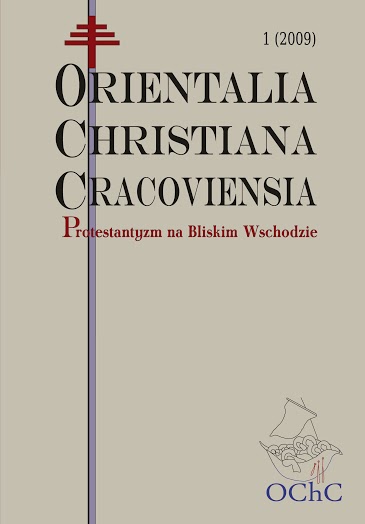Wszyscy wspinamy się na tę samą górę, choć ścieżki są różne. Teodor Monod i islam
DOI:
https://doi.org/10.15633/ochc.1002Słowa kluczowe:
Teodor Monod, Amadou Hampâté Bâ, islam, chrześcijaństwoAbstrakt
Teodor Monod (1902–2000) scientist, explorer, Protestant, worked on improving Christian and Muslim relations by means of his own private contact with Muslims. In doing so he was not interested in combining ideas and practices coming from different sources into one syncretic form. However, being open to searching for – as he put it – the manifestations of God’s Spirit, he was not limited to his own religious tradition and perceived the manifestations of God’s Spirit beyond the conventional limits of his own religion, which confirmed him in his own religious beliefs. For Teodor Monod the contact with Islam through the teaching of Muslim mystics (Sufis) of the tijaniyya-hammaliyya brotherhood – Cerno Bokar and Amadou Hampâté Bâ – constituted a practical confirmation of his already shaping views on the possibility to reach the truth and its consequences as well as on religious pluralism. In the multi-religious world Monod looked for the solutions to give testimony of his own faith in a non-intrusive yet firm way, believing that there are numerous paths leading to God. His admiration for Islam referred firstly not to the system itself – if you may put it so – but to the particular people living in the system and observing its indications in a way which did not result in a hiatus between the faith and the practice of life. It harmonized strongly with the ideals inherited by Monod with his religious and family tradition. Neither Teodor Monod’s attitude nor the ideas that he proclaimed and put into practice constitute a model followed by a significant group of his fellow believers. Monod was more of a “lone sailor” wandering through life and showing that the goals which may seem impossible to some can be reached, in fact.
Bibliografia
Brenner L., The West African Sufi. The Religious Heritage and Spiritual Search of Cerno Bokar Saalif Taal, London 1984.
Brenner L., Amadou Hampâté Bâ: Tijânî francophone, [w:] La Tijânîyya. Une confrèrie musulmane à la conquête de l’Afrique, eds J.-L. Triaud, D. Robinson, Paris 2000, s. 289-326.
Devey M., Hampâté Bâ: l’homme de la tradition, [Cadenet] 1993.
Froelich J. C., Les Musulmanes d’Afrique Noire, Paris 1962.
Griffith S. H., Bediüzzaman Said Nursi and Louis Massignon in Pursuit of God’s Word. A Muslim and a Christian on the Straight Path, „Islam and Christian-Muslim Relations” 19 (2008) nr 1, s. 5–16, http://dx.doi.org/10.1080/13510340701770246.
Jarry I., Théodore Monod, Paris 1990.
Monod T., Un éclaireur: Louis Massignon, „Question de” 90 (1992).
Monod T., Témoignage, [w:] Louis Massignon et ses contemporains, dir. J. Keryell, Paris 1999, s. 355–360.
Monod T., Terre et ciel. Entretiens avec Sylvain Estibal, Arles 1997.
Traore A., Islam et colonisation en Afrique: Cheikh Hamahoullah, homme de foi et résistant, Paris 1983.
Triaud J.-L., Islam in Africa under French Colonial Rule, [w:] The History of Islam in Africa, eds N. Levtzion, R. L. Pouwels, Athens 2000, s. 169–188.
Vikør K., Sufi Brotherhoods in Africa, [w:] The History of Islam in Africa, ed. by N. Levtzion, R. L. Pouwels, Oxford 2000, s. 441–476.
Vray N., Monsieur Monod. Scientifique, voyageur et protestant. Biographie, Arles 1994.
Pobrania
Opublikowane
Numer
Dział
Licencja
Twórca oświadcza, że przysługują mu prawa autorskie do utworu i że nie są ograniczone w zakresie objętym niniejszym oświadczeniem oraz że utwór jest dziełem oryginalnym i nie narusza praw autorskich innych osób.
Twórca zezwala Uniwersytetowi Papieskiemu Jana Pawła II w Krakowie na nieodpłatne, niewyłączne i nieograniczone w czasie korzystanie z utworu, to jest:
- utrwalanie i zwielokrotnianie: wytwarzanie egzemplarzy utworu techniką drukarską, reprograficzną, zapisu magnetycznego oraz techniką cyfrową;
- obrotu oryginałem albo egzemplarzami, na których utwór utrwalono (wprowadzanie do obrotu, użyczenie lub najem oryginału albo egzemplarzy, publiczne wystawienie, wyświetlenie, a także publiczne udostępnianie utworu w taki sposób, aby każdy mógł mieć do niego dostęp w miejscu i w czasie przez siebie wybranym);
- włączenie utworu w skład utworu zbiorowego;
- udzielanie przez Uniwersytet Papieski Jana Pawła II w Krakowie sublicencji Creative Commons Uznanie autorstwa-Użycie niekomercyjne-Bez utworów zależnych 3.0 Polska
Uniwersytet Papieski Jana Pawła II w Krakowie udostępnia utwór na Platformie Czasopism należącej do uczelni, na licencji Creative Commons Uznanie autorstwa-Użycie niekomercyjne-Bez utworów zależnych 3.0 Polska. Tym samym uprawnia wszystkich zainteresowanych do korzystania z utworu pod następującymi warunkami:
- zostanie podany autor i tytuł utworu,
- zostanie podane miejsce publikacji (tytuł czasopisma i adres internetowy do oryginalnie opublikowanego utworu),
- utwór będzie dystrybuowany w sposób niekomercyjny,
- nie będą tworzone utwory zależne.

